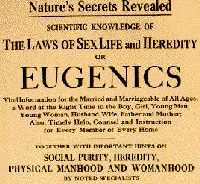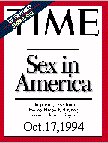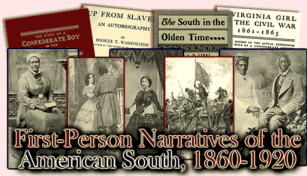NATURE VS. NURTURE:
HOW MUCH FREE WILL DO REALLY WE HAVE?
In the summer of 1994 Time magazine's cover
 story featured a scientific tale about the genetic underpinnings of human
infidelity. In case you missed the punch line, it goes something like this:
Individuals' most basic drive involves insuring that their genetic codes
survive death, that motivations to make a billion bucks or to be the most
wonderful person in the world are really attempts to attract the "right"
person with whom to transfer genes into the next generation. Men and women
are by nature supposedly fairly promiscuous apes. As is the case among
species where males' body size is greater than females,' men are innately
polygynous (87% of the 1154 known human societies allow multiple wives)
with the more "successful" males broadly spreading their genetic
code (the last Sharifian Emperor of Morocco, Moulay Ismail, sired more
than 1,000 children). Women, on the other hand, limited by their ability
to generally bear but one child a year, will do whatever it takes to guarantee
the survival of their offspring, including tricking supportive men into
raising the another male's child.
story featured a scientific tale about the genetic underpinnings of human
infidelity. In case you missed the punch line, it goes something like this:
Individuals' most basic drive involves insuring that their genetic codes
survive death, that motivations to make a billion bucks or to be the most
wonderful person in the world are really attempts to attract the "right"
person with whom to transfer genes into the next generation. Men and women
are by nature supposedly fairly promiscuous apes. As is the case among
species where males' body size is greater than females,' men are innately
polygynous (87% of the 1154 known human societies allow multiple wives)
with the more "successful" males broadly spreading their genetic
code (the last Sharifian Emperor of Morocco, Moulay Ismail, sired more
than 1,000 children). Women, on the other hand, limited by their ability
to generally bear but one child a year, will do whatever it takes to guarantee
the survival of their offspring, including tricking supportive men into
raising the another male's child.
This is but the latest controversy surrounding humans'
bestial origins and traits, an issue underlying the gap between the
"humanities"
and the "sciences." Remember the public outcry against Darwin's
thesis--as recently as 1993, more than half the
American
public still believed that the idea of humans developing from earlier animal species was
probably
or definitely not true! Nowadays its successor, sociobiology (along with such variants as
psychobiology--see Paul
Kenyon's "Biological Bases of
Behaviour" page--and evolutionary
psychology) haunts the social sciences as it tilts the
nature-nurture
equation of human fate toward natural explanations. See Al Cheyne's (University of
Waterloo) Psychology, Culture
& Evolution website.
What are the implications of truly believing that one's
 behaviors are due to uncontrollable genetic impulses? Caught philandering
or stealing? Instead of saying "the devil made me do it" I guess
you can now argue that "it runs in the family." But what happens
when people are no longer held accountable for their actions? Is society
even possible if its rules cannot be observed? This issue underlies not
only philosophical debates over free will and determinism but also the
current trend toward our becoming a no-fault no-risk culture (Did you get caught shooting at the
President? Argue temporary insanity. For an inventory of some of the most
frivolous lawsuits see the Stella
Awards.) Click here for PBS's
A Science Odyssey series on how twentieth century's theories of human behavior
have alternated in the primacy given to nature and nurture.
behaviors are due to uncontrollable genetic impulses? Caught philandering
or stealing? Instead of saying "the devil made me do it" I guess
you can now argue that "it runs in the family." But what happens
when people are no longer held accountable for their actions? Is society
even possible if its rules cannot be observed? This issue underlies not
only philosophical debates over free will and determinism but also the
current trend toward our becoming a no-fault no-risk culture (Did you get caught shooting at the
President? Argue temporary insanity. For an inventory of some of the most
frivolous lawsuits see the Stella
Awards.) Click here for PBS's
A Science Odyssey series on how twentieth century's theories of human behavior
have alternated in the primacy given to nature and nurture.
What does free will mean to you? How much free will
do you think you have? In the wake of the 1997
suicides of members of Heaven's
Gate in Rancho Santa Fe, California, the largest mass suicide in the United
States, the question was again raised. Were these 39 people acting on their
own volition or were they brainwashed by their wild-eyed leader, persuaded
by a sustained psychological regimen, or perhaps ensnared in some lethal
groupthink dynamic? Click here to see international
rates of agreeing that "we each make our own fate." What,
if anything, happens when people believe that their fates are predetermined,
whether by genes, their environments, or by God?
Such questions are far from academic musings. The role of
genetics versus environment, of nature versus nurture, underlie such public debates as gender
roles, homosexuality (see
PBS's Frontline edition on "Assault
on Gay America"),
and individuals' proclivity toward violence. Society depends upon people being responsible
for their actions (hence it does not punish those who commit deviant acts but who either didn't
know better, were mentally ill, or had no alternatives to act in non-deviant ways). And
from the perspectives of individuals, those who sense having no control
over their lives, who believe that there is no relationship between what
they do and how things turn out, run the risk of becoming fatalistic or victims of
learned
helplessness.
Citation for international survey:
International Social Survey Program (ISSP). 1994.
International
Social Survey Program: Religion, 1991 Computer file. Koeln, Germany:
Zentralarchiv fuer empirische Sozialforschung producer. 1993. Koeln, Germany:
Zentralarchiv fuer empirische Sozialforschung/Ann Arbor, MI: Inter-university
Consortium for Political and Social Research distributors.
According to the 1993 NORC General Social
Survey, we
have the following glimpse of Americans' beliefs:
- LIFE GOD: How life turns out--[is because]
Such things are decided by God.
| RESPONSE CATEGORY |
% RESPONSES |
| Very Important |
23% |
| Important |
28% |
| Somewhat Important |
22% |
| Not At All Important |
23% |
- LIFE GENES: How life turns out--[is
because]
Some people are born with better genes than others.
| RESPONSE CATEGORY |
% RESPONSES |
| Very Important |
3% |
| Important |
28% |
| Somewhat Important |
29% |
| Not At All Important |
30% |
- LIFE SOC: How life turns out--[is because]
Society gives some people a head start and holds others.
| RESPONSE CATEGORY |
% RESPONSES |
| Very Important |
13% |
| Important |
37% |
| Somewhat Important |
33% |
| Not At All Important |
13% |
- LIFE WORK: How life turns out--[is
because]
Some people use their will power and work harder than others.
| RESPONSE CATEGORY |
% RESPONSES |
| Very Important |
57% |
| Important |
36% |
| Somewhat Important |
4% |
| Not At All Important |
1% |
- LIFE CHANCE: How life turns out--[is
because]
It's just a matter of chance.
| RESPONSE CATEGORY |
% RESPONSES |
| Very Important |
3% |
| Important |
16% |
| Somewhat Important |
37% |
| Not At All Important |
42% |
Of these, LIFE GENES produces the greatest
correlations
with the others. The greater the importance individuals place on genes
in determining fate the more likely they say LIFE SOC, LIFE CHANCE, and
LIFE GOD are "very important." And who is most likely to see
genes being important or very important? We find:
- while high school drop outs are about one-quarter more
likely than those with four or more years of college to believe that genes are important or very
important in determining individuals' fates, those of the upper
class (54%) are significantly more likely than those of the lower (33%)
and working (36%) classes to so believe;
- those 70 years of age and older are more than three
times more likely than those 18 to 29;
- within categories of age (18-29, 30-39, ..., 70+),
the conditional relationships between education
and importance placed on genes evaporates;
- those who are strongly religious are more than
one-quarter
more likely than those with no religious affiliation, with those from liberal
Protestant denominations being more likely to say genes are important or
very important (47%) than Jews (41%), Catholics and moderate Protestants
(38%), and fundamentalist Protestants (36%);
- those believing homosexual relations are always wrong
are more likely (42%) than those saying they are not always wrong (30%);
- and there is no significant differences in responses
of the sexes, races, political parties, and those who believe or disbelieve
in the theory of evolution.
Belief that individuals' fate is decided by God also
produces some interesting relationships. Consider, for instance, the relationship
between this belief and whether or not Americans believe that "human
beings developed from other species of animals." Click here to see
how these beliefs hang together in the minds of
political liberals, moderates, and conservatives.
Cross-nationally we can see
considerable
rates of agreement/disagreement with the statement "the course of
our lives is decided by God." So what is the relationship between
believing that "we each make our own fate" and "the course
of our lives is decided by God"? In this figure,
the United States is compared with countries that are predominantly Catholic,
predominantly Protestant, mixed Protestant and Catholic, Catholic countries
that were formerly Communistic, and formerly Communist nations. Observe
how as disagreement that "we each make our own fate" increases
there is generally increasing agreement that "the course of our lives
is decided by God." However, rates intriguingly vary across this grouping
of countries.
SOCIOBIOLOGY:
TO WHAT EXTENT IS FATE THE PRODUCT OF GENETIC
PROGRAMMING?
According to Richard
Dawkins (click here
for more information), the ultimate goal of the game of life is the immortality
of one's information. This information is of two forms: the genetic, the
programming of one's DNA, and the memetic, the units of mental information
individuals pass on in their culture. "We are survival machines,"
he writes in The Selfish Gene, "robot vehicles blindly programmed
to preserve the selfish molecules known as genes."
And "just as genes propagate themselves in the
gene pool by leaping from body to body via sperms or eggs, so memes propagate
themselves in the meme pool by leaping from brain to brain via a process
which, in the broad sense, can be called imitation."
Evidence of possible genetic factors shaping the direction
of individuals' lifelong interests and behaviors mounts. For example, Alexander
Graham Bell, who accidentally invented the telephone while working on ways
to help the hearing impaired, came from a family that was preoccupied with
matters of speech and sound. Both his mother and his wife were deaf. His
paternal grandfather wrote a book on phonetics and developed a cure for
stammering, which was taught by his father and uncle. To detect such intergenerational
legacies, psychologists employ genograms
 to map the multigenerational proclivities of family members. Now, with the
rapid developments in genetic engineering, the beginning of the 21st century
bears certain eerie similarities to the eugenics movement of the early 20th
century (visit the Image
Archive on the American Eugenics Movement at the DNA Learning Center at Cold
Spring Harbor Laboratory).
to map the multigenerational proclivities of family members. Now, with the
rapid developments in genetic engineering, the beginning of the 21st century
bears certain eerie similarities to the eugenics movement of the early 20th
century (visit the Image
Archive on the American Eugenics Movement at the DNA Learning Center at Cold
Spring Harbor Laboratory).
It is worth noting the sad history of attempts to link
cultural differences and social deviance to genetic "imperfections."
In the early physiognomic literature on deviance, for instance, Cesare
Lombroso reported in the 1870s how criminals had inordinately long
legs in comparison with rest of their bodies, strange skull shapes, absence
of a proper chin, ingrown ear flaps or big, protruding ears. They were,
he argued, throwbacks to earlier stages of human evolution. At the beginning of
the century appeared The
Blood of the Nation: A Study of the Decay of Races Through the Survival of the
Unfit, a vile work by David Starr Jordon, the first President of
Stanford University. Indeed, the American
Eugenics Movement was to underlie the Nazi's "racial purity"
political campaign, which was to culminate in the Holocaust. (Check out
Deadly
Medicine: Creating the Master Race from the
U.S. Holocaust Memorial Museum.) And during the Nixon presidency, Dr. Arnold Hutschnecker
proposed to the Health, Education and Welfare Department that all American
children be psychologically tested at age six with ink blots to detect
criminal tendencies. The "hard core" of these "future delinquents"
would be sent off to appropriate "camps" where they would learn
more socially accepted behavior patterns.
- Center for Evolutionary Psychology UC Santa Barbara
- Behavioral Ecology and Sociobiology (Springer journal)
- Johann Peter
Murmann & Joe Fleischhacker's Evolutionary Theories in the Social Sciences
-
Leslie Jones, "Social Darwinism Revisited"
- David N. Menton, "The Religion of Nature: Social Darwinism"
- Edward
O. Wilson, "The Biological Basis of Morality"
- Barry Mehler, "In Genes We Trust: When Science Bows to Racism"
- André N. Sofair and Lauris C. Kaldjian, "Eugenic Sterilization and a Qualified Nazi Analogy: The United States and Nazi Analogy: The United States
and Germany, 1930-1945"

BEGINNING WITH
THE BODY
SELF
Life is like a game of cards. The hand that is dealt
you represents determinism; the way you play it is free will.
--Jawaharlal
Nehru
 In many ways, social psychology begins with the body.
According to Enid Schildkrout in
Body
Art as Visual Language, "if the impulse to create art is one of the
defining signs of humanity, the body may well have been the first canvas. ...
Body art is a visual language. To understand it one needs to know the
vocabulary, including the shared symbols, myths, and social values that are
written on the body." Consider the following findings:
In many ways, social psychology begins with the body.
According to Enid Schildkrout in
Body
Art as Visual Language, "if the impulse to create art is one of the
defining signs of humanity, the body may well have been the first canvas. ...
Body art is a visual language. To understand it one needs to know the
vocabulary, including the shared symbols, myths, and social values that are
written on the body." Consider the following findings:
- studies often show that the single most critical factor
in self-esteem is physical appearance.
- salaries of U.S. executives over 6 feet tall exceed
those of executives under 5'5" by an estimated $4,200 (Harper's
Magazine's "Harper's
Index," May 1993).
- According to the American Society of Plastic Surgeons, the number of people
undergoing cosmetic surgery tripled between 1992 and 1999.
-
 One study of the
role of attractiveness in affecting
court decisions found that defendants judged to be unattractive were more
likely to be judged guilty and to receive a prison sentence than attractive
ones. A 1999
Gallup survey revealed Americans agreeing that attractiveness is a plus in
modern society--and only 2% rated themselves as being below average in looks.
With these points in mind take a visit to Beauty
Worlds: The Culture of Beauty and to Lindie Pavati's Beauty
Matters.
One study of the
role of attractiveness in affecting
court decisions found that defendants judged to be unattractive were more
likely to be judged guilty and to receive a prison sentence than attractive
ones. A 1999
Gallup survey revealed Americans agreeing that attractiveness is a plus in
modern society--and only 2% rated themselves as being below average in looks.
With these points in mind take a visit to Beauty
Worlds: The Culture of Beauty and to Lindie Pavati's Beauty
Matters.
- A study of a random sample of 10,039 people aged 16-24
surveyed in 1980 and 1988 found that women who were overweight during their
teens and early twenties were, when compared with the rest, 20 percent
less likely to get married and in households with incomes that averaged
$6,710 less.
- In 1993, the New York Times asked six foreign photographers to
 comment on one of their images that reveals a telling aspect of America.
Observed Tomas Muscionico of a Ernest Hemingway look-alike festival in Key
West, Florida: "There is no other country where people so cherish the
ability to look like famous people. I could spend the rest of my life
photographing look-alike contests as well as ugly baby contests, conventions
of twins. Although these are fascinating events, there is a sense of
desperation and emptiness in a society that places such a high regard on
looking like someone else." ("Foreigners Frame America," July
5, 1993)
comment on one of their images that reveals a telling aspect of America.
Observed Tomas Muscionico of a Ernest Hemingway look-alike festival in Key
West, Florida: "There is no other country where people so cherish the
ability to look like famous people. I could spend the rest of my life
photographing look-alike contests as well as ugly baby contests, conventions
of twins. Although these are fascinating events, there is a sense of
desperation and emptiness in a society that places such a high regard on
looking like someone else." ("Foreigners Frame America," July
5, 1993)
- Judging from what theme makes up most of the traffic
of images in this cyberspace medium, there exists an American obsession
with the "bulge factor." The current trend is for females to
augment their breasts. Why else would 150,000 American women accept the
risks of having breast implants each year, more than 80 percent for purely
cosmetic reasons? And what is to be inferred from a 1991 (February) "Harper's
Index" claiming that the average size bra worn by an American
woman increased from 34B in 1985 to 36C in 1991? (That same year, Triumph
 International Japan, a Japanese lingerie firm, marketed in honor of Mozart's
bicentennial year, a brassiere that played 20 seconds of a Mozart variation,
using the memory chip found in musical greeting cards.)
International Japan, a Japanese lingerie firm, marketed in honor of Mozart's
bicentennial year, a brassiere that played 20 seconds of a Mozart variation,
using the memory chip found in musical greeting cards.)
- Baring all as means of delivering social protest: As the
U.S., Britain and other nations mobilized for war against Iraq in 2002 and
2003, one strategy that proved successful in making news agencies carry
anti-war sentiments was to create messages with nude bodies.
- Materialism and the body self: "Commodification
and the Value of Human Life"
- Horace Miner's 1956 classic
"Body Ritual among the Nacirema"
- Examples of the ways social factors shape biological processes
- Links to body/corporeality theory
from Voice of the Shuttle
- The Face: Meaning and Expression
-
bodyicon:
Columbia U. Graduate School of Journalism project examining mass media representations of
women's bodies and their consequences
- BME: Body
Modification Ezine
- The Almost Complete Body
Piercing Links List
- Yahoo:Left-Handers

- Left-Handers Day
- Bald Headed Men of America
(you know, the BHMA
- The Troubled History of Beards
Did you know Russia's Peter I and England's Henry VIII & Elizabeth I taxed their
bearded subjects?
- Body
Art
- Russian Prison Tattoos
- Tall People:Clubs
- Little People of America
- National
Association
to Advance Fat Acceptance Home Page
- A
Sizism Page
- NAAFA: National Association to Advance Fat
Acceptance
GENDER
AND SEXUALITY

Few cases provide better evidence of how biological
matters determine social fates than how social roles are universally
allocated and personality traits inferred from individuals' genitalia.
Are the gender roles occupied by men or women the product of nature or
nurture? Is the inferior status of women (a 1990 survey found only 22%
of Americans believing women have a better life than men) a natural inevitability
(which is why Freud, who promoted anatomical destiny, is the bane of feminists)
or is it the consequence of male oppression?
In The Fine Line: Making Distinctions in Everyday
Life (Free Press, 1991), Eviatar Zerubavel observes how "Only
two centuries ago, the mental gap between the sexes was so wide that women
were perceived as "closer" to animals than to men and granting
them political rights seemed as ludicrous as extending such rights to beasts."
(p.65) Nowadays the search for distinguishing characteristics of the sexes
continues, from differences in brain structures, biological drives (e.g.,
testosterone's aggressive side effects), social drives (are women's drive
to achieve more a function of fear of failure than desire for success?),
language (Deborah Tannen speaks of "genderlects" in You Just
Don't Understand, socialization differences, and the sexes' ways of
knowing (the assumption that women's ways of knowing differ from men's
has recently led to curricular reforms throughout the country). In 1991,
when noting how out of touch male politicians are with their constituencies,
the late Barbara Jordon argued that "women have a capacity for understanding
and compassion which a man structurally does not have, [and] does not have
it because he cannot have it. He's just incapable of it."
And then there's the matter of sex.
Perhaps in no other instance do we find clearer example of the difficulties
of our dual nature as both near-angel and beast than in the case of human
sexuality, whose drive supposedly overwhelms rational thought. This activity
we share with animals is endowed with considerable meaning: Every civilization
has produced distinctive ideas concerning the nature of sexuality and its
relationship to religious, philosophical, economic, political, legal, familial,
and educational systems. (Click
here for a collection of international and state laws regarding matters of
sex.) From society's perspective, the issue is how to
channel such powerful urges into socially acceptable and "functional"
outlets. It is a curious anomaly of modern American life how little historical
and social scientific perspective we have on the topic of sexuality given
our supposedly sex-obsessed society (and the number of sites here in cyberspace
dedicated to the topic). Nevertheless, according to the World
Health Organization, sexual intercourse occurs worldwide more than
100 million times daily, resulting in 910,000 conceptions and about 350,000
cases of sexually transmitted disease.
How would you explain the decreasing age of Americans' first
sexual experiences--despite widespread STDs, AIDS, and the Bush Administration's
abstinence programs? According to a Kaiser
Family Foundation report
released May 2003 (n=1,800), half of American 15-to-17-year-olds have
engaged in sexual relations. Biologically, sexual maturity has come
earlier; over the past century and a half the age at menarche has declined by
three-quarters of a month per decade. Social maturity, on the other
hand, comes later. According to the 2002 General Social Survey, most
Americans believe that one is not grown up until the age of 26. The 2000
Census revealed over 4 million Americans aged 25-34 live in the home of their
parents.
And what about homosexuality? To what extent is it
a product of nature or nurture? Current perceptions are a legacy of the
nineteenth century, when sexual activities were first used to define the
people who engaged in them. As Michel Foucault observed, "The sodomite
had been a temporary aberration; the homosexual was now a species."
Instead of being something that people did homosexuality became who they
were: a different biological creature than heterosexuals.
Sexuality
Information & Education Council of the U.S) overview
of State Sexuality Laws
- Sexual
Assault Information Page
CLOTHES MAKE THE
PERSON

The greater the social control the greater the body
control expected. The scope of this maxim extends beyond controlling biological
processes (e.g., either hiding them, as in the case of copulation or excretion,
or, as in the case of eating, covering them with etiquette) to the clothing
that we wear. Dress is a language. Throughout history, clothing fashion has been
used as means for differentiating people, reaffirming the differences between
elites and non-elites, between children and adults, and between men and
women. In medieval times, clothes denoted one's place in a strict,
inherited social hierarchy.
In the 1990s, hundreds of Iranian women have been
arrested
by morals police for dress code violations. In 1995, Navy Admiral Jeremy
Boorda committed suicide, perhaps to remove any chance of scandal surrounding
his wearing of two Vietnam combat decorations. The
White House pushes for uniforms in the public schools. And nearly 25
million American workers wear some type of uniform (or "career
apparel").
ENVIRONMENTAL/ECOLOGICAL
PSYCHOLOGY--WITH A FOCUS ON THE SOUTHERN MIND
 Another family of deterministic models of human
behavior
(including environmental
psychology, ethology, cultural
geography, and behavioral ecology) focuses on the defining role of the natural
environment. Does, for instance, increasing summer heat lead to increasing
levels of assaults and rapes, as some psychological biometeorologists have
found? Why are people most likely to make their wills in the Spring? Why
are accidental death rates the highest in the Southwest? Why are homicide rates greatest in the
South? Can the ecological model observed in nature (e.g., matters of territoriality, niches, etc.)
be applied to human affairs?
Another family of deterministic models of human
behavior
(including environmental
psychology, ethology, cultural
geography, and behavioral ecology) focuses on the defining role of the natural
environment. Does, for instance, increasing summer heat lead to increasing
levels of assaults and rapes, as some psychological biometeorologists have
found? Why are people most likely to make their wills in the Spring? Why
are accidental death rates the highest in the Southwest? Why are homicide rates greatest in the
South? Can the ecological model observed in nature (e.g., matters of territoriality, niches, etc.)
be applied to human affairs?
Resources on color psychology:
- Psychology of Color from
infoplease
- Pantone
Color Institute
- The Color Association of the United States
- Color Matters: psychological effects of color

Resources on regional psychology
The Southern Mind
The Midwest Mind
CONCLUDING
THOUGHTS ON THE
"NATURE" SIDE OF
HUMAN BEHAVIOR
Animal behaviors are either instinctive or learned.
Much is random and therefore isn't really "behavior": a flagellating
protozoa isn't "looking for" food. When social scientists speak
of human behavior they mean purposeful and meaningful activities.
It is implied that humans are aware of their own activities and those of
others. In other words, human behaviors are learned rather than instinctive.
Instincts, which are behaviors that are performed without learning,
evolved as adaptations to specific situations. But adaptive success comes
at a cost: Instincts make organisms "puppets" of their environment.
With the stimulus of rain a frog croaks, just as the rooster crows with
the stimulus of dawn. Neither the frog nor the rooster had any choice in
the matter; their behaviors were simply determined by the
environment.
In higher-order species like mammals we find fewer
instincts and, hence, greater behavioral flexibility and environmental
adaptability. Mammals are engaged in a constant process of adaptation to
avoid extinction. Humans have the fewest instincts; instead, we have differing
genetic propensities and capacities to respond to our surroundings. For
us, therefore, environment remains a potent determinant of behavior.
Social scientists are increasingly appreciating the
extent of the interactions that take place between nature and nurture.
The presence of genes does not by itself ensure that a particular trait
will be manifested. Genes require the proper environments for innate tendencies
to be fully expressed. These "proper environments"
consist not only of natural surroundings but also of individuals' social and symbolic
milieus.
AND WHAT ABOUT THE NURTURE SIDE OF THE
EQUATION?
Culture is a system of ideas about the nature of the world
and how people should behave in it that is shared--and shared uniquely--by members of a
community. It involves the logico-meaningful domain of social life: the cognitive-knowing, the
normative-acting, and the expressive-feeling dimensions of life. In one sense, culture is a
system of canned recipes--cognitive and behavioral habit-sets or algorithms, if you will--for
dealing with others, enabling individuals to behave without having to make calculated
decisions. During times of considerable cultural change these recipes no longer "work,"
leading to the emergence of subcultures whose recipes do.
Distinguishing nature vs. nurture in terms of determinism vs. free will is probably
erroneous when one considers the extent to which enculturation patterns minds,
selves and behavior. Recent evidence indicates that culture actually shapes the hard-wiring of
the human primate, a creature largely born bereft of instinct and known for its extreme
plasticity. Consider the news of
1995 reporting that if you are going to learn how to play the violin you had better do it before
the age of 12: Physiological analyses revealed the brains of those who played string
instruments in childhood are different from those who did not (research by Thomas
Elbert and
associates, reported in the October 13,
1999 issue of Science). The fact that different
synaptic patterns are laid down in musicians and non-musicians may be direct evidence of the
relationship between human tools and physiological design. Musical instruments were perhaps
among the first tools of our species, whose brain changed as we played away.
- The Nijmegen
Cultural Psychology Group
- Margaret Mead: Human Nature and the Power of Culture (Library of Congress's
commemoration of the 100th anniversary of Mead's birth)
- Steve Olson, "The Archaeology of Race,"
The Atlantic Monthly (April 2001)
SO TO WHAT EXTENT ARE WE A PRODUCT OF NATURE VS. NURTURE?
(AND HOW CAN WE TELL?)
One contemporary version of the predestination-free will riddle involves the
degree to which intelligence is the product of genetics as opposed to
socialization environment. The only way to really find out is to
control one and let the other vary, such as examining the fate of identical
twins raised in different homes. This, in fact, is precisely what is being
studied in the Twins-Reared-Apart Project at the
University of Minnesota (Dr. Thomas J. Bouchard, Jr.,
principal investigator). They find that approximately 70% of the variation
in IQ can be attributed to genes.
Ultimately, it is probably misleading to say that X% of behavioral trait is due
to genes and (100-X)% is due to nurture/environment. The key is to
understand the interactions between the two. See Ari Berkowitz's "Our genes, ourselves?"
- "Sources of human
psychological differences: The Minnesota study of twins reared apart" (Bouchard,
et al.)

 Return to Social Psychology Index
Return to Social Psychology Index
 story featured a scientific tale about the genetic underpinnings of human
infidelity. In case you missed the punch line, it goes something like this:
Individuals' most basic drive involves insuring that their genetic codes
survive death, that motivations to make a billion bucks or to be the most
wonderful person in the world are really attempts to attract the "right"
person with whom to transfer genes into the next generation. Men and women
are by nature supposedly fairly promiscuous apes. As is the case among
species where males' body size is greater than females,' men are innately
polygynous (87% of the 1154 known human societies allow multiple wives)
with the more "successful" males broadly spreading their genetic
code (the last Sharifian Emperor of Morocco, Moulay Ismail, sired more
than 1,000 children). Women, on the other hand, limited by their ability
to generally bear but one child a year, will do whatever it takes to guarantee
the survival of their offspring, including tricking supportive men into
raising the another male's child.
story featured a scientific tale about the genetic underpinnings of human
infidelity. In case you missed the punch line, it goes something like this:
Individuals' most basic drive involves insuring that their genetic codes
survive death, that motivations to make a billion bucks or to be the most
wonderful person in the world are really attempts to attract the "right"
person with whom to transfer genes into the next generation. Men and women
are by nature supposedly fairly promiscuous apes. As is the case among
species where males' body size is greater than females,' men are innately
polygynous (87% of the 1154 known human societies allow multiple wives)
with the more "successful" males broadly spreading their genetic
code (the last Sharifian Emperor of Morocco, Moulay Ismail, sired more
than 1,000 children). Women, on the other hand, limited by their ability
to generally bear but one child a year, will do whatever it takes to guarantee
the survival of their offspring, including tricking supportive men into
raising the another male's child.

 In many ways, social psychology begins with the body.
According to Enid Schildkrout in
In many ways, social psychology begins with the body.
According to Enid Schildkrout in








